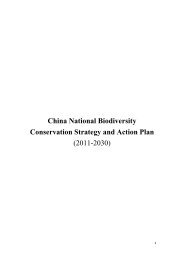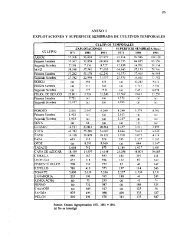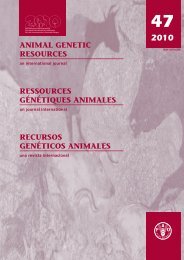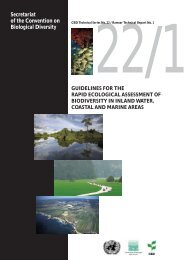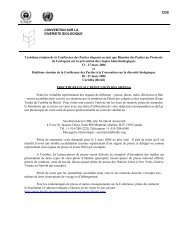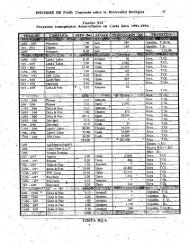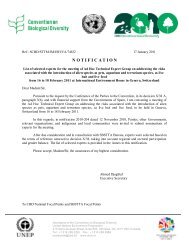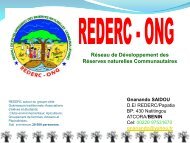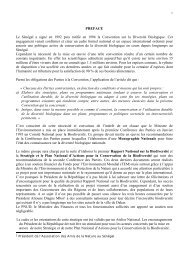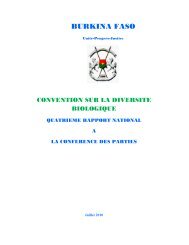English - Convention on Biological Diversity
English - Convention on Biological Diversity
English - Convention on Biological Diversity
Create successful ePaper yourself
Turn your PDF publications into a flip-book with our unique Google optimized e-Paper software.
84<br />
COUNTRY STUDY FOR BIODIVERSITY OF THE REPUBLIC OF MACEDONIA<br />
4.4. Access to genetic resources<br />
With regard to agricultural producti<strong>on</strong>, FAO, as an internati<strong>on</strong>al organisati<strong>on</strong><br />
protecting the interests of the agriculture professi<strong>on</strong> (am<strong>on</strong>g other areas), pays<br />
c<strong>on</strong>siderable attenti<strong>on</strong> to genetic diversity. Within the structure of the organisati<strong>on</strong>,<br />
independent bodies exist which deal with plant and animal biological diversity (IPGRI –<br />
Internati<strong>on</strong>al Plant Genetic Resources Institute and DAD – Domestic Animal <strong>Diversity</strong>),<br />
an important factor for agricultural producti<strong>on</strong>. The Republic of Maced<strong>on</strong>ia is a member<br />
of these organisati<strong>on</strong>s, which operate through working groups that form an informati<strong>on</strong><br />
system under which each of the member countries is obliged to submit reports and<br />
provide:<br />
• a basic characterisati<strong>on</strong> of varieties and breeds;<br />
• support for planning, identificati<strong>on</strong>, collecti<strong>on</strong> and use of biological diversity;<br />
• suggesti<strong>on</strong>s, exchanges of experiences and facilitati<strong>on</strong> of the interactive participati<strong>on</strong><br />
of all interested members in the process of genetic diversity maintenance;<br />
• for the creati<strong>on</strong>, maintenance and updating of genetic resource databases.<br />
All relevant informati<strong>on</strong> is available through the publicati<strong>on</strong>s of FAO via the internet<br />
(www.cegiar.org/ipgri and www.fao.org/dad-is).<br />
The access to plant genetic resources stored in gene-banks is not legally regulated in<br />
the Republic of Maced<strong>on</strong>ia. The collecti<strong>on</strong>s in the gene-banks are freely available for<br />
exchanges with any other gene-bank. All <strong>on</strong>e must do is make a request by ordinary<br />
letter, since such cases are generally arranged through pers<strong>on</strong>al c<strong>on</strong>tacts. Maced<strong>on</strong>ian<br />
collecti<strong>on</strong>s can not be found <strong>on</strong> the internet, nor are any porti<strong>on</strong>s of the databases present<br />
<strong>on</strong> other plant networks existing around the world. C<strong>on</strong>sequently, they are unknown to<br />
the worldwide community unless some<strong>on</strong>e has pers<strong>on</strong>al c<strong>on</strong>tact with some of the<br />
breeders in Maced<strong>on</strong>ia. Since collecti<strong>on</strong>s in gene-banks are free for exchange anywhere<br />
in the world, it is necessary to immediately prepare methodologies and documents in<br />
order to achieve that purpose. Furthermore, data in existing collecti<strong>on</strong>s should be<br />
updated and placed in appropriate informati<strong>on</strong> systems, allowing them to become part of<br />
the internati<strong>on</strong>al databases of specific plants. This will help increase the interest in the<br />
biological diversity found within Maced<strong>on</strong>ia and eventually provide ec<strong>on</strong>omic benefits<br />
arising from the profits generated by any commercial breeding company which uses<br />
Maced<strong>on</strong>ian materials in the producti<strong>on</strong> of commercial varieties.<br />
4.5. Indirect uses of biodiversity<br />
Nature’s great diversity has its own intrinsic value, which imposes a moral<br />
requirement up<strong>on</strong> humanity to evaluate biodiversity. This tenet gave rise to the<br />
movement at the end of the twentieth century (especially in the United States) called<br />
“deep ecology” (Tobias, M. ed. 1985. Deep Ecology. Avant Books: San Diego, CA, 285<br />
pp.). Essentially, it means “all organisms are entitled to live.”<br />
The preventi<strong>on</strong>, or at least reducti<strong>on</strong>, of the c<strong>on</strong>tinual loss of biodiversity, however,<br />
is linked to its exploitati<strong>on</strong> and to political decisi<strong>on</strong>s. In order to help politicians in their<br />
decisi<strong>on</strong>-making, it is necessary to assign appropriate values to biodiversity, which is the<br />
objective of this secti<strong>on</strong>. In additi<strong>on</strong> to direct, easily measurable values, biodiversity also<br />
has indirect values, without which the human community could not survive. Most of<br />
these values are not specific to Maced<strong>on</strong>ia, but are universal.



